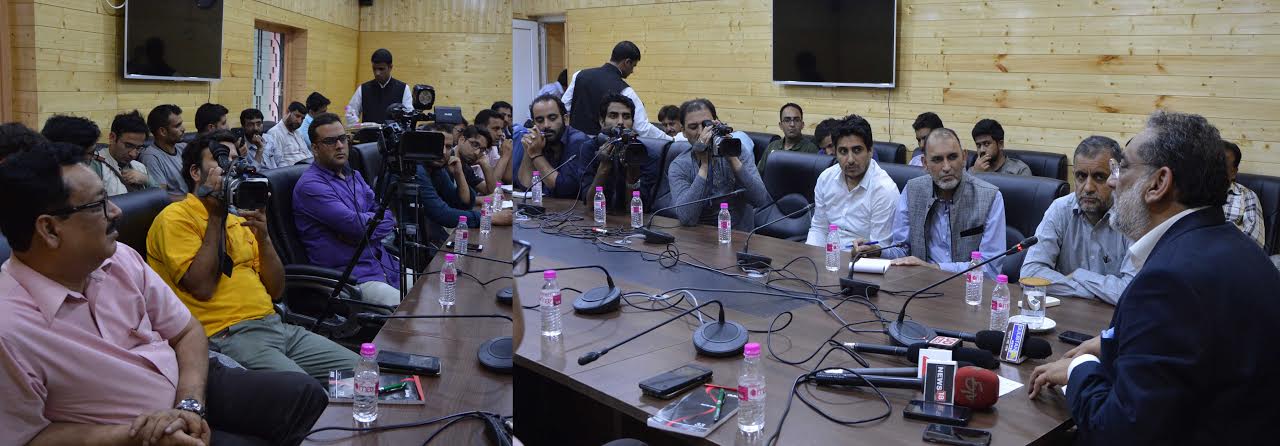SRINAGAR: Minister of Finance, Dr Haseeb A Drabu today said the government will factor in constitutional, legislative, administrative and institutional issues distinct to J&K while implementing GST in the State.
“Apart from safeguarding the special constitutional position of Jammu and Kashmir, we will also factor in administrative, legislative and other safeguards under the new tax regime,” Dr Drabu said in an interaction with the media-persons here today.
Commissioner Secretary Finance, Mr Navin Kumar Choudhary and Director Information, Mr Muneer-ul-Islam was also present during the interaction.
During his 90-minute marathon deliberations regarding GST with media-persons at the Media Complex here, Dr Drabu said the Government has been discussing the new tax regime at various levels to build broader consensus before bringing Jammu and Kashmir under the ambit of GST regime. He explained in detail the benefits of the new tax regime for which all the states except Jammu Kashmir have given nod and would be applied from July 1. He said the biggest beneficiaries of this tax regime would be the consumer, and the consumer states will be benefitted the most, instead of manufacturing states getting the cream under Sales Tax and VAT regimes.
Drabu termed apprehensions regarding GST as false. He said a false perception is being created among people regarding the new tax regime. “There is no such thing of compromise on existing position. It is written in Agenda of Alliance as well that there would be no compromise in exiting constitutional position,” he said.
“Our intentions are clear. Unfortunately a completely wrong perception has been created by vested interests among the people about GST. Let me make it amply clear that we will ensure adequate safeguards for the State’s fiscal autonomy while implementing GST,” Dr Drabu said.
The Finance Minister said Jammu and Kashmir has the most empowered legislative assembly which has residuary powers. “The harmonization that has happened in the GST Council over the years made me comfortable with the evolving system, despite my initial opposition to it,” he said and added that, as he has maintained earlier also, GST Council is the symbol of real federal structure in the country where the powers to decide on taxes have been vested with the State Governments.
“When I today support it (GST), I support it because it has enough flexibility. For instance the biggest flexibility is the first time constitution amendment to the Indian constitution specifically mentions that this is not applicable to J&K, that itself shows the respect shown by the Parliament of India and Government of India for the special position of J&K,” he said.
Dr Drabu said J&K is going through tough times over the last three decades and it is for the first time that a Constitutional Amendment will be discussed at various levels to remove any misconceptions. He said ironically 46 such amendments have been extended to the state since 1947 without even being discussed at any level.
“We are going through very difficult times. The situation is fragile and we don’t want social chaos which ultimately impacts our economy. Under the new tax regime, our powers to levy tax remain unchanged,” he said.
The Finance Minister said the Government has already convened two All Party Meetings on the issue and the third such meeting is being convened here tomorrow where threadbare discussions will be held and everyone will be taken on board.
“The GST changes the way one functioning in terms of compliance and collection of taxes. It is a major policy shift that will empower the consumer and there will be some hiccups for three to four months. But it will stabilize the system ultimately, making it more efficient and people-friendly,” Dr Drabu said.
“The aim of the GST is that the businesses must grow and become clean and superior. Due to new tax regime, stunted business will get an impetus. If the law is not extended to the state, no trader will be able to get goods from outside because they don’t have GST number and neither can we export,” he said and added non-implementation of GST would lead to complete chaos with traders and businessmen being hit the worst and ultimately it would lead to acute scarcity of consumer goods in the State.
He said in absence of an alternative trading links, J&K is literally integrated with mainland Indian market. Entire requirements are imported from various parts of the country and everything produced or manufactured in J&K is exported to the same market. “Twin taxation systems dissociated from each other will entail huge costs to business and to public finance system,” he said and added that trading processes will be subjected to twin taxation systems making everything costly in J&K, a cost that ultimately the consumer shall have to bear. He said traders will have to pay more for managing twin systems and it could create a situation that J&K may not get buyers or sellers. The Input Tax Credit (ITC) that shall otherwise become available to the end consumer will get blocked at Madhavpur, the first town outside J&K.
Allaying the fears of traders, the Finance Minister said the incentives offered by the State and Central Government on various industries in Jammu and Kashmir will continue. “The State as well as the Central Government will continue to provide exemptions, factoring in all the incentives,” he said.


